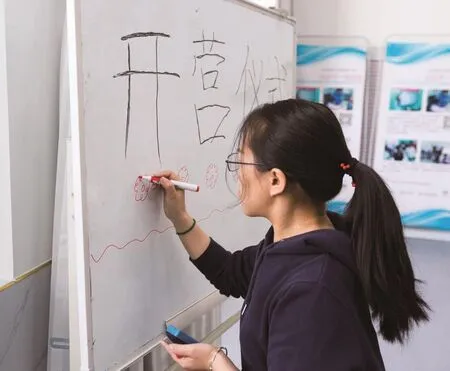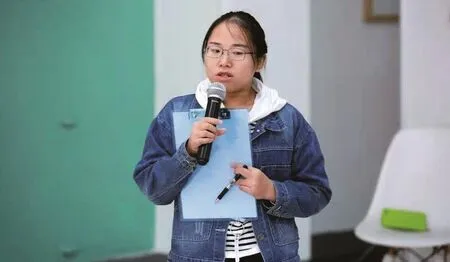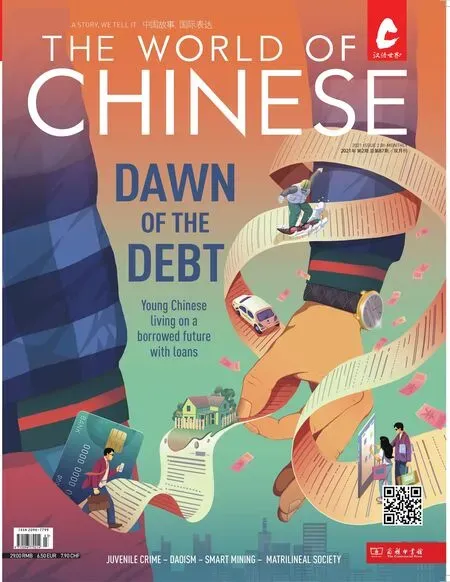TONG CAN:THEY BLAMED MY FEMALE CAREGIVERS
SOME SAID IT WAS TONG’S MOTHER’S FAULT TO HAVE EATEN FROG MEAT DURING HER PREGNANCY, AND THAT HER GRANDMOTHER BROUGHT TONG UP IMPROPERLY

Over the phone, Tong Can’s voice sounds peaceful, yet resonates with power.She works for the Taiyangyu Rare Diseases Counseling Center, a Tianjin-based social work and counseling center that dedicates itself to the mental well-being of people with rare diseases.Tong is in charge of making daily visits to hospital wards, registering and documenting patients’ counseling requests, organizing events for patients, and raising funds for medical aid.
Tong is one of over 100,000 people in China living with osteogenesis imperfecta, more widely known as brittle bone or “china doll” disease.Those who have this rare condition have bones that break easily, as well as short stature, loose joints, hearing loss, breathing problems, and teeth problems.Tong was diagnosed at the age of 21 after experiencing several bone fractures in her teens, but has been able to walk without crutches after a surgery in 2014.
Among the most overwhelming parts of Tong’s condition were the changes in the attitude of people around her.Neighbors in her village near Honghu, Hubei province,pointed fingers at her mother and grandmother, the women who raised Tong—saying it was her mother’s fault she ate frog meat during her pregnancy, and that her grandmother brought Tong up improperly.
In her village, Tong saw that people’s perceptions of disability were different for men and women.Growing up, she rarely saw disabled people.She only realized after shedeveloped her own impairment that some were just invisible.She had never thought of her uncle, who had physically impaired legs, as“disabled”—he just “walked funny.”
In contrast, Tong found herself immediately typecast by people around her after developing her condition.Neighbors commented that she would be dependent on her parents for the rest of her life; family members stopped expecting her to be able to work.A relative called her condition a “significant misfortune”for the family.
The social stigma puts significant burden on disabled women in the areas of love, marriage, and sexuality.In Tong’s experience, disabled men didn’t have to worry about finding a partner until after they turned 20, while disabled girls would be squeezed into numerous arranged blind-dates from much earlier ages,told by their family, “Youth is the only thing you have [to bring to a marriage].”
Getting married is the unspoken yet overarching life goal set for these women.Being unmarried, they are considered a family burden,especially to their brother (if they have one).However, if a man is disabled, it’s deemed perfectly normal for their single or married sisters to live with and look after them.
When the disabled women in Tong’s village manage to marry and become mothers, they are sidelined in giving childcare by relatives, who sometimes will even remove the child to their own home; or if that doesn’t happen, they are expected to perform heavy child-rearing tasks at the same level as able-bodied women.
Social prejudices form a sophisticated dating hierarchy for disabled women in rural areas.Disabled women aspire to marry able-bodied men, rather than stay single or have a disabled partner.One result is that rural disabled women often marry much older men who had not been able to find a partner due to their age, lack of wealth, or other factors.After all,noted Tong, marriage is a significant matter of “face” for both parties.

Tong believes firmly in her own autonomy in love matters.She initially protested to the blind dates arranged by her family, but eventually agreed to go on a few.Most of her suitors were relatively well-off men with intellectual disabilities.“Now I think there’s a certain wisdom to it,” she said with a laugh.“I don’t have mental issues.So if I pair up with a man with an intellectual disability, his able body compensates my impairment, while I remain the‘mind’ of our relationship.”


Tong is also ambivalent about portraying people with disability as victims, and wonders if it is a“necessary evil.” “If pity effectively brings good outcomes to people with disabilities in policy, awareness, and resources, is it so wrong?” she muses.“When people with disabilities benefit from paternalistic protection,does the concept of ‘rights’ remain the single most important thing?”

